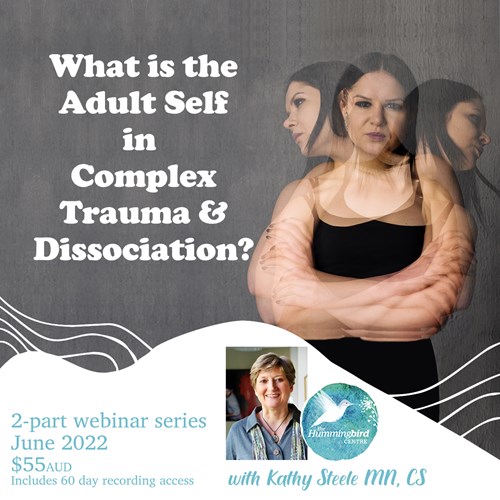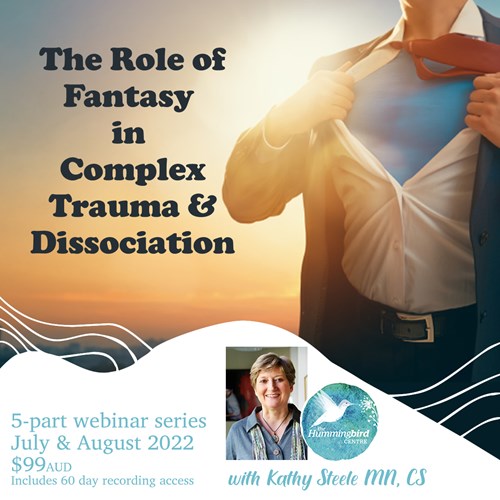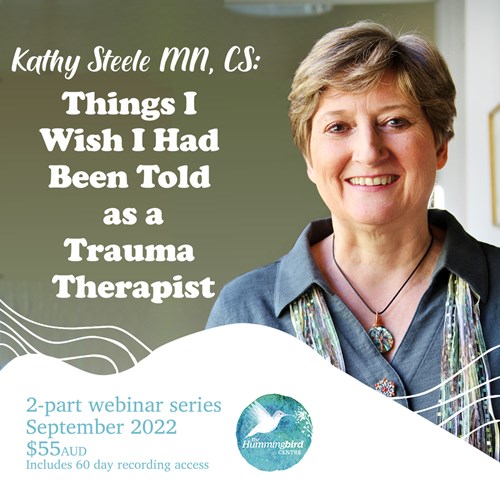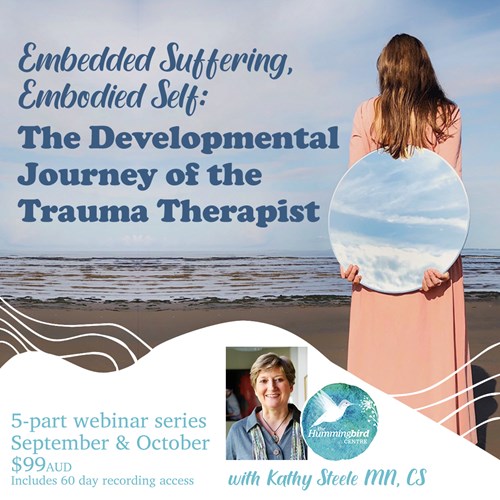Kathy Steele Webinars 2022
Complex Trauma and Dissociation
Kathy Steele is back in 2022 with 4 new topics on Complex Trauma & Dissociation! Save 20% by purchasing all 4 topics!
Topic 1: What Is the Adult Self in Complex Trauma and Dissociation?

There is some controversy over whether it is necessary to work directly with all parts or only to work with parts through the “adult self” in clients with DID and Complex PTSD. This workshop will describe problems that have led some clinicians to emphasize working solely through the adult self, such as dependency of child parts, chaotic switching, and unwillingness of the adult self of the client to engage in treatment. We will explore what we are really trying to achieve by requesting an “adult part” in the room, that is, to ensure the client can engage in a cooperative therapeutic endeavor. An alternative that allows for more flexibility in working directly with parts as needed will be offered. We will focus on three main issues: (1) how to access capacities in the client that are required to engage in effective psychotherapy: the ability to be present, to access and regulate emotion, to work cooperatively with the therapist, to share subjective experience, and to reflect; (2) how to decide when it is in the client’s benefit to work through an adult part or more directly with other parts; and (3) how to engage the entire systems of parts in each session.
Participants will be able to:
- Describe rationale for working through the adult self, as well as the pros and cons of this approach
- List capacities needed for a client to engage in effective psychotherapy
Topic 2: The Role of Fantasy in Complex Trauma and Dissociation

Fantasies can provide wonderful momentary escapes from reality that resource and inspire us, improving our lives. They can provide alternative explorations of secure attachment and healing. However, they may also become prisons serving to avoid reality, driving maladaptive expectations and behaviors. We will discuss the roles of conscious and unconscious fantasies in clients with complex trauma and dissociation, including the newer concept of maladaptive daydreaming. Types of fantasies include omnipotent and perfectionistic wishes that manifest in inner critical beliefs and avoidance of help and support; fantasies of care and rescue that drive dependency; fantasies of the perfect relationship; narcissistic fantasies of power, control, and exceptionalism; erotic fantasies; and fantasies involving rage, sadomasochistic elements, and revenge. The role of fantasy in the development of dissociative parts will also be discussed. Participants will learn how to recognize both conscious and unconscious fantasies and discuss these with their clients in a nonjudgmental and curious way. We will then explore ways to resolve the central conflicts and avoidance of reality in these fantasies, including promotion of grieving and acceptance.
Participants will be able to:
- Discuss the adaptive role of fantasy in trauma recovery.
- Identify maladaptive fantasies that prevent progress in therapy.
- Identify ways to uncover fantasies that are not conscious to the client.
- Delineate core issues involved in maladaptive fantasies in trauma survivors.
- Analyze different types of fantasies and therapeutic approaches to their resolution.
Topic 3: Things I Wish I Had Been Told as a Trauma Therapist

In this webinar I will share understandings that would have been helpful to know in my earlier years of being a trauma therapist, as well as the costs of not knowing. I will include mistakes I have made in treatment and countertransference reactions that others can hopefully learn from.
Participants will be able to:
- Identify at least five issues that are not discussed early in the training of a trauma therapist that would be helpful to know.
- Discuss therapeutic mistakes and how to learn from them.
Topic 4: Embedded Suffering, Embodied Self: The Developmental Journey of the Trauma Therapist

There is much literature on vicarious traumatization in trauma therapists. We know that it is common for us to become overwhelmed, burned out, or even traumatized ourselves. In fact, this seems to be a normal and periodic hurdle in the developmental life of therapists. However, little attention is paid to how we use our embodied self with our clients, and how this effects what of their suffering we do or do not take on. We will discuss ways in which sitting with trauma affects not only our emotions, but of course, our bodies, where those emotions are felt. Our capacity for empathy and attachment are essential bridges that connect us deeply with our clients, but also can become conduits for their suffering to be transferred to our own bodies, a burden we may carry to our own detriment. How can we find the best balance between empathy and taking on the pain of our clients without becoming disconnected? It is in only in our small but steady movements toward accepting our embodied self—for better and worse--that we can most fully be with our clients, without having to take on their suffering as our own. Finally, we will discover ways to care for ourselves through the practices of reflection, enjoyment and exuberance, activity and stillness, and meaningful connection with others. These can provide restoration and resilience to our own vulnerable embodied self.
Participants will be able to
- List ways in which being with traumatized clients affects their own bodies
- Describe ways to set mental boundaries, while remaining present with clients in order to prevent vicarious traumatization
- Practice at least 3 ways to replenish and renew themselves to prevent burnout.
- Discuss developmental issues in the early, middle and late stages of our careers as trauma therapists.
- Describe embodied engagement and five areas of growth for the therapist.
Cost
$250AUD
Valued at $308
Includes 60 day recording access.
Professional Development CEs not applicable.
14 Webinars On Demand
60 day recording access is included if you miss it!
